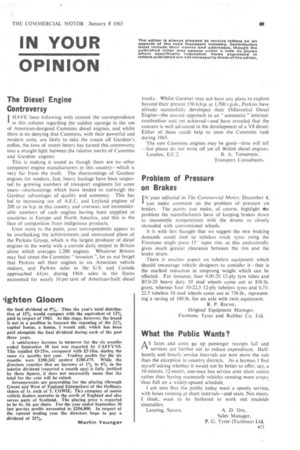IN YOUR OPINION
Page 71

If you've noticed an error in this article please click here to report it so we can fix it.
The Diesel Engine Controversy
• I HAVE been following with interest the correspondence in this column regarding the sudden upsurge in the use of American-designed Cummins diesel engines, and whilst there is no denying that Cummins, with their powerful and modern units, are likely to take the cream off Gardner's coffee, the tone of recent letters has turned this controversy into a straight fight between the relative merits of Cummins and Gardner engines.
This is making it sound as though there are no other competent engine manufacturers in this country—which is very far from the truth. The shortcomings of Gardner engines for modern, fast, heavy haulage have been suspected by growing numbers of transport engineers for some years----,shortcomings which have tended to outweigh the Gardner advantages of quality and economy. This has led to increasing use of A.E.C. and Leyland engines of 200 or so h.p. in this country and overseas, not inconsiderable numbers of such engines having been supplied to countries in Europe and North America, and this in the face of competition from indigenous products.
Even more to the point, your correspondents appear to be overlooking the achievements and announced plans.of the Perkins Group, which is the largest producer of diesel engines in the world with a current daily output in Britain alone which averages 1,200 engines. Whatever Britons may feel about the Cummins 'invasion ", let us not forget that Perkins sell their engines to six American vehicle makers, and Perkins sales in the U.S. and Canada approached £44m. during 1964: sales in the States accounted for nearly 10 per cent of American-built diesel
trucks. Whilst Gardner may not have any plans to explore beyond their present 150 b.h.p. at 1,700 r.p.m., Perkins have already successfully developed their Differential Diesel Engine—the nearest approach to an " automatic " internalcombustion unit yet achieved—and have revealed that the concern is well advanced in the development of a V8 diesel. Either of these could help to stem the Cummins rush during 1965.
The new Cummins engines may be good—time will tell —but please do not write off yet all British diesel engines.
London, E.C.2. B. A. THOMPSON,
Transport Consultants.
Problem of Pressure on Brakes
IN your editorial in The Commercial Motor, December 4, I you make comment on the problem of pressure on brakes. The points you make, of course, highlight the problem the manufacturers have of keeping brakes down to reasonable temperatures with the drums so closely shrouded with conventional wheels.
It is with this thought that we suggest the new braking demands could lead to tubeless truck tyres using the Firestone single piece 15' taper rim, as this undoubtedly gives much greater clearance between the rim and the brake drum.
There is another aspect on tubeless equipment which should encourage vehicle designers to consider it—that is the marked reduction in unsprung weight which can be effected. For instance, four 9.00-20 12-ply tyre tubes and B7.0-20 heavy duty 10 stud wheels came out at 856 lb. gross, whereas four 10-22.5 12-ply tubeless tyres and 6.7522.5 tubeless 10 stud wheels come out at 756 lb., represent. ing a saving of 100 lb. for an axle with twin equipment.
R. P. ROCHE,
Original Equipment Manager, Firestone Tyres and Rubber Co. Ltd.
What the Public Wants?
A S fares and costs go up passenger receipts fall and " services are further cut to reduce expenditure. Halfhourly and hourly service intervals are now more the rule than the exception in country districts. As a layman I find myself asking whether it would not be better to offer, say, a 10-minute, 12-seater, one-man bus service over short routes rather than having mammoth vehicles running more empty than full on a widely-spaced schedule.
I am sure that the public today want a speedy service, with buses running at short intervals—and seats. Not many, think, want to be bothered to work out roadside timetables.
Lancing, Sussex. A. D. Dix, Sales Manager,
P. G. Tyrer (Turbines) Ltd.




















































































































